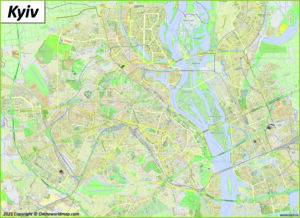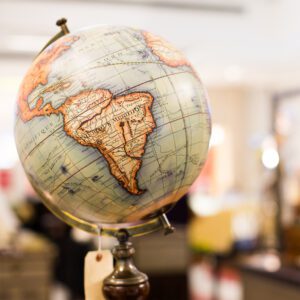
When Russia invaded Ukraine last February, millions of Americans were momentarily perplexed to see daily press dispatches from the war-torn city of Kyiv.
Before last February, most Americans were doing well to find Ukraine on the map, and the only Ukrainian city most Americans had ever heard of was Chicken Kiev. The similarities between “Kiev” and “Kyiv” are unquestionably suggestive, but the abrupt media rebranding caught most Americans flatfooted.
As we’ve since been given to learn, Kiev is an exonym, a name given to a place by people who don’t live there. Kyiv is an endonym, a name given to a place by people who do. Except that, at least in the case of Kiev/Kyiv, it’s not really that simple.
“ …lots of exonyms are leftovers from the Roman Empire, which never conquered a land it couldn’t rename.”
Founded in the 9th century by a confederation of Turkic-speaking Khazar steppe tribes, the site was a border settlement protected by a fortress called Kuyawa. The fort was a thorn in the side of its Slavic neighbors, who adapted Kuyawa to their own Rus tongue as Kiev, a name recorded on 1,200-year-old birch bark manuscripts unearthed there. The city remained Kiev, inside and out, until 1995 when a newly independent Ukraine, associating the name Kiev with centuries of Russian/Soviet domination, formally changed it to Kyiv in honor of Kyi, a legendary and quite probably mythological medieval city hero.

Now bathed in an international spotlight, the city’s new handle has refreshed ongoing conversations about the propriety of exonyms, and there’s plenty to discuss. Thousands of exonyms are in use today, and every language on Earth uses them. Exonyms are reserved almost exclusively for regions, nations and large cities, because those are the places that generate the most chatter. The more important the place, the more likely it is to have an exonym or two, or five, or a dozen. Also, nearly all of the exonyms we use were coined before 1700, as expanding international trade during the Industrial Revolution normalized intact endonyms around the globe.
If you’re wondering why anyone would bother giving a new name to a place that already has one, there are several reasons, most of them reasonable. Many exonyms are mere conveniences, workarounds for awkward foreign words and pronunciations. Austria certainly becomes the English-speaking mouth more readily than Oesterreich, and “Zhongguo” seems like a lot of work compared to “China.”
Others were originally applied because they made more sense in foreign ears than the endonyms they replaced. Hungary’s endonym, Magyarorszag, means “Land of the Magyars.” Unimpressed with the pastoral Magyars, ancient cartographers defaulted to the area’s more familiar and vaguely glamorous medieval name, Hungaria, which means Land of the Huns. Spain’s endonym, Espana, derives from the Carthaginian “Ispania,” which translates as “Land of Rabbits,” so shortening the name to Spain works on at least two levels.
Pre-Raj India had dozens of names, and even now it goes by endonyms ranging from Jambudweepa to Hindustan, and from Aryavarta to Bharat. The efficiency-minded English cut through the clutter with the time-honored Latin “India,” or Land of the Indus River. Indeed, lots of exonyms are leftovers from the Roman Empire, which never conquered a land it couldn’t rename. Germania (exonym Germany, endonym Deutchland), Aegyptus (exonym Egypt, endonym Masr) and Finnia (exonym Finland, endonym Suomi) are all hand-me-downs down from the Caesars, now firmly rooted in 2,000 years of common usage.
“In 1935, Persia successfully persuaded the rest of the world to start calling it by its endonym, Iran.”
English uses relatively few exonyms, possibly because of England’s relative isolation in ancient times. China uses a ton of them, the result of trying to phonetically approximate foreign names using an unwieldy pictographic alphabet, often with delightful results. Rendered in ancient Hanzi characters, the United Kingdom becomes Yingguo, or Brave Country, Germany translates as Deguo, or Virtue Country, and America is Meiguo, or Beautiful Country. Similarly, and for similar reasons, the U.S. translates from Japanese as Beikoku, or Land of Rice.
Interestingly, the French used to pronounce Paris precisely as we do today. In a fit of Gallic joie de vivre, however, they dropped the “s” from, well, pretty much everything, making the city’s native pronunciation “Paree,” and making fully-pronounced Paris an endonym that became an exonym. In the other direction, America is an exonym hung on the New World by a German cartographer in 1507, but which has since gone native, making it an exonym that became an endonym.
Every now and then a country or city will try to shake off an exonym it doesn’t like. In 1935, Persia successfully persuaded the rest of the world to start calling it by its endonym, Iran. In 1939, the monarchy of Siam became parliamentary Thailand, and in 2008, imperial Peking reinvented itself as socialist Beijing.

The United Nations doesn’t like exonyms, condemning them as arrogant echoes of colonial oppression and, worse, culturally disrespectful. For what it’s worth, the nation that’s known to itself as Hellas is known by dozens of exonyms including Greece, Grecia, Griechenland, Kreeka and Gorogorszag, and all those foreign names don’t seem to bother the Hellenes one bit.
As a matter of language, exonyms are not sobriquets, pseudonyms or slang. The names we use for Krung Thep (Bangkok), Al-Qahirah (Cairo) and Baile Atha Cliath (Dublin) are correct and proper English, suitable for all uses foreign and domestic. From a press point of view, two hallmarks of good journalism are clarity and concision, which is why writing guides often caution against the use of endonyms where familiar exonyms exist.
Which brings us back to Ukraine.
Is the name Kiev an exonym? Yes, because it was initially given to the city by outsiders. No, because it became and remained the capital’s chosen title for more than a thousand years. And yes, because a city’s endonym is whatever its inhabitants say it is, and if the good citizens of Kiev would rather think of themselves as the good citizens of Kyiv, it’s nobody’s business but their own.
So take your pick. Whether you say Kyiv or Kiev, you’re saying it right.
